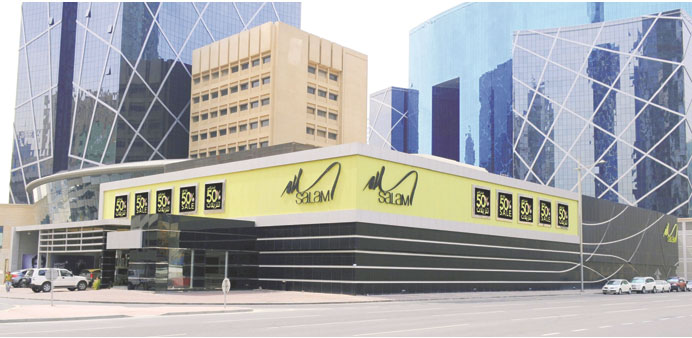By Santhosh V Perumal/Business Reporter
Salam International Investment (SIIL) yesterday said the Qatar Financial Market Authority’s (QFMA) decision to suspend its shares from trading for the third time was “unjustified” and “in contradiction” to a court decision regarding mergers that took place in 2002 and 2005.
“The board re-emphasises its conviction that such suspension is unjustified particularly with the sufficient and adequate disclosures made by SIIL,” the company said.
Despite the proposals submitted, the QFMA “remained silent”, resulting in the extension of the suspension of trading, since February this year, although SIIL has clarified the negative impact and the damaging results that are “irredeemable,” it said.
“The suspension of the trading and prolonging its period, will only lead to harm shareholder rights and interests of the company on the one hand and to undermine the confidence in the company’s shares on the other hand,” SIIL said.
Such “silence” of the QFMA ignoring the best protection of the shareholders and the continuous damage occurring to SIIL and its shareholders, led SIIL to file a complaint to the grievance committee to review the QFMA decision of suspension that is still under its perusal, the company said.
On February 24, subsequent to the “unjustified” suspension decision, the market regulator proposed to form a joint team comprising the QFMA, the Qatar Exchange and SIIL representatives to which SIIL responded promptly by naming its nominated member, it said.
The representative of SIIL co-operated fully with the QFMA by providing them with the required documentation to include those related to the different stages of the merger process. SIIL has also furnished to the QFMA the contingency plan and the disclosures to deal with the Court of Appeal’s decision if it becomes in its executive form, the company said.
SIIL said it has taken precautions by holding all available shares of former owners of merged companies, concluding an undertaking signed by the owners of the merged companies to fully abide by the execution of the court decision once it becomes final and voluntarily initiating the owners of the merged companies to release the attachment imposed upon 11.5mn shares owned by them to be under the disposal of the QFMA in addition to those previously held.
After four intensive meetings with the QFMA representatives discussing the plan of execution of the court decision when it becomes in its final form, the meeting failed. “Regretfully the QFMA insisted to interpret the court decision in accordance with its own understanding which was in contradiction with court’s decision reasoning and the details,” SIIL said.
The Court of Appeal in its decisions number 71 and 104 of 2011 upheld the Court of First Instance’s decision to nullify the executive process of merger of several SIIL subsidiaries that took place in 2002 and 2005, according to SIIL.
The court’s nullification have not touched on the correctness of the subject nor the formalities conducted to issue the resolutions of the general assembly related to these mergers, it said, adding the latter was the ground for the subject of appeal that was clarified by the Court of Cassation, which returned the cases to the Court of Appeal for review with a new panel.
Upon review of the decision and the reasoning thereof, SIIL resubmitted another appeal within the legally allowed time limits to the Court of Cassation to overturn the latest Court of Appeal decision, SIIL added.
SIIL’s three-pronged expansion strategy eyes sustainable profits
Salam International Investment (SIIL) has embarked on a three-pronged strategy, which includes expansion of its consumer services and retail trade sectors, to realise sustainable profits.
“We expect that the performance in 2013 will be better than that of 2012,” SIIL chairman Issa Abdul Salam Abu Issa told shareholders yesterday at the annual general assembly.
For the purpose of implementing the company’s future plans, SIIL’s plan will be based on three pillars, which together aim at realising sustainable profits and attenuating the impact of periodicity of revenues coming from contracting activity, he said.
SIIL reported a fall in net profitability in 2012 mainly due to drop in revenues coming from its subsidiaries operating primarily in the contracting, as they came under pressure because of the scarcity of profitable projects in 2012, he said.
However, Issa said SIIL and its subsidiaries working in the contracting have won several tenders for projects in 2013.
One of the pillars would be to expand consumer services and retail trade sectors, which have considerable growth opportunities and quick cash flow, he said, adding it was also integrating contracting activities that include construction, information technology, and oil and gas services.
SIIL businesses suffered a decline in investment income and property rents, with a hike in financing costs of some investment opportunities that need longer maturation period – including Salam Bounian Development (SBD), it said.
Due to the fact that the majority of SBD shares are owned and controlled by SIIL and because of the mutual interests, the company is currently working on restructuring relationships with Bounian – in particular the one that involves The Gate project as to convert it from a relationship of property rental to a real partnership, he said.
The general assembly was also informed that SIIL’s Dubai-based Salam Enterprises Company, Modern Decoration Company, Alu Nasa Aluminium Industries, Salam Media Cast and Salam Studio and Stores have been issued licences.
The company is currently completing the registration procedures with full ownership of “Atelier 21” in Dubai. The value of the unregistered share, at the time of purchase, amounted to about QR468,000.
SIIL also obtained the approval to register a Jordanian company fully owned by the subsidiary Salam Studio and Stores.
The general assembly was advised about SIIL board’s in-principle approval to proceed with the full acquisition of SBD.

